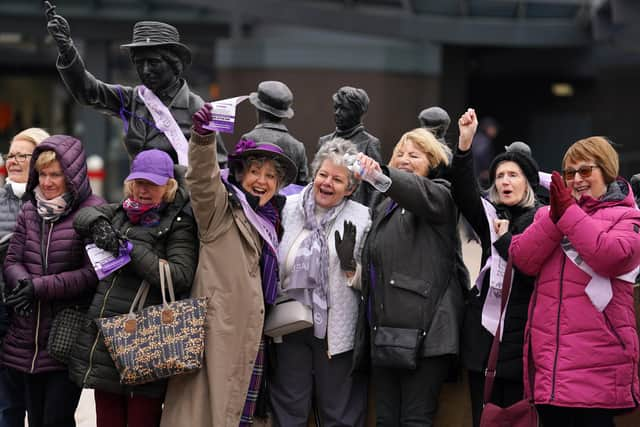DWP needs to own up to its WASPI errors, issue an apology and put in place robust processes to avoid this happening again - Ros Altmann
It highlights clear failings and indicates that millions of women are owed an apology, to acknowledge the impact on their retirement plans, but does not recommend the level of compensation many WASPI women were hoping for.
Of course, an apology would be a start, but will not pay the bills for those plunged into poverty as a result of not knowing their State Pension Age had been increased. Nor will it remedy the distress, anger and anxiety for women born during the 1950s.
Advertisement
Hide AdAdvertisement
Hide AdAlthough the Report suggests possible redress somewhere between £500 and £3,000, it does not make specific recommendations to cover all WASPI women. And even these levels of blanket compensation would cost taxpayers between around £2bn and £10bn. These are huge sums and, because he believes the Department for Work and Pensions (DWP) has not even acknowledged its failings, the Ombudsman is handing Parliament the direct responsibility for what happens next.


Of course, not all WASPI women deserve thousands of pounds of compensation. Even the Ombudsman says, many women did know about the increase and they stayed working. Others had private and public sector pensions they could draw on before their state pension started, but millions had no idea of the delay.
In fact, in 2004, the DWP's surveys showed that huge numbers of WASPI women had no idea their state pension age would not be 60. Yet still it failed to act for several more years. This is a serious failure that caused significant harm to many women.
When I was Minister, it seemed I was the only person in the DWP who believed the issue of women’s state pension age needed to be taken seriously and that Government failures had caused severe hardship. Having campaigned against 2011 Coalition Government proposals to further increase women’s state pension age beyond the 1995 measures, I knew there were problems.
Advertisement
Hide AdAdvertisement
Hide AdUnfortunately, Parliament ploughed ahead regardless of the pleas from myself and many others. Accelerating the increases after 2015 was unfair and the WASPI campaign started around that time. The women have been campaigning ever since for compensation. I was hoping to devise a scheme for those worst affected to claim money to tide them over, but this was rejected both by fellow Ministers and the women themselves. After losing their case for discrimination in the High Court, they appealed to the Parliamentary Ombudsman in 2019.
What happens next is entirely up to Parliament and I hope there will be swift action. The first important matter is for the DWP to own up to its errors, issue an apology and ensure it has processes to avoid this happening again.
Then Parliament must decide what, if any, blanket compensation is offered and whether there will be a scheme that those worst affected can claim from on a case by case basis. But I am afraid the WASPI campaigners who hoped for many thousands of pounds for each of the 1950s-born women, are going to be disappointed.
Whatever is done, though, needs to happen swiftly, to end this ongoing saga that has caused so much misery.
Baroness Ros Altmann is a British life peer and former pensions minister.
Comment Guidelines
National World encourages reader discussion on our stories. User feedback, insights and back-and-forth exchanges add a rich layer of context to reporting. Please review our Community Guidelines before commenting.